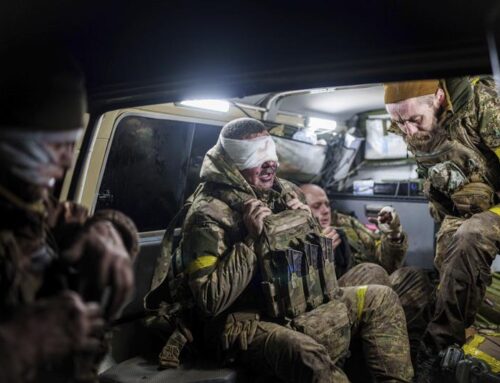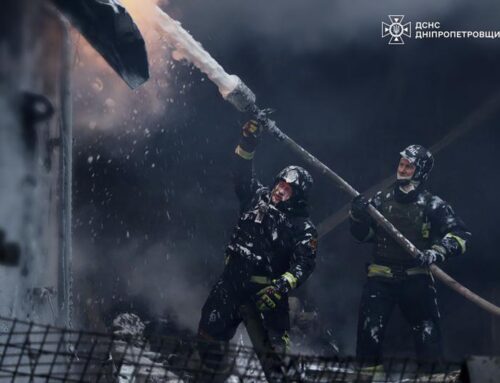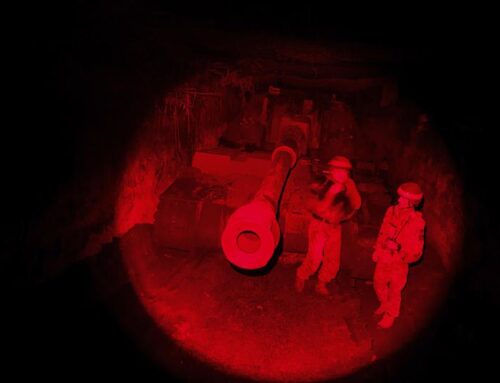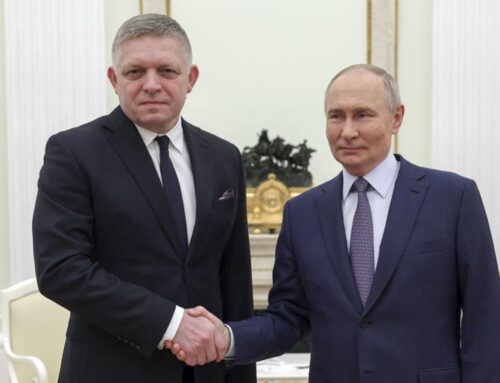KYIV, Ukraine (AP) — The head of the Russian private army Wagner claimed Saturday that his forces have taken control of the city of Bakhmut after the longest and most grinding battle of the Russia-Ukraine war, but Ukrainian defense officials denied it.
In a video posted on Telegram, Wagner head Yevgeny Prigozhin said the city came under complete Russian control at about midday Saturday. He spoke flanked by about half a dozen fighters, with ruined buildings in the background and explosions heard in the distance.
However, after the video appeared, Ukrainian deputy defense minister Hanna Maliar said heavy fighting was continuing.
“The situation is critical,” she said. “As of now, our defenders, control certain industrial and infrastructure facilities in this area.”
Serhiy Cherevatyi, spokesman for Ukraine’s eastern command, told The Associated Press that Prigozhin’s claim “is not true. Our units are fighting in Bakhmut.” In a statement on Facebook, the Ukrainian General Staff said “heavy battles for the city of Bakhmut do not stop.”
Mykhailo Podolyak, an adviser to Ukrainian President Volodymyr Zelenskyy, said “this is not the first time Prigozhin has said ‘we seized everything and are dominating’.” He also suggested that the Wagner chief’s statement was aimed at drawing attention away from Zelenskyy’s recent highly visible trips overseas, including to the Group of Seven summit in Japan on Saturday.
Fighting has raged in and around Bakhmut for more than eight months.
If Russian forces have taken control of Bakhmut, they will still face the massive task of seizing the remaining part of the Donetsk region still under Ukrainian control, including several heavily fortified areas.
It is not clear which side has paid a higher price in the battle for Bakhmut. Both Russia and Ukraine have endured losses believed to be in the thousands, though neither has disclosed casualty numbers.
Zelenskyy underlined the importance of defending Bakhmut in an interview with The Associated Press in March, saying its fall could allow Russia to rally international support for a deal that might require Kyiv to make unacceptable compromises.
Analysts have said Bakhmut’s fall would be a blow to Ukraine and give some tactical advantages to Russia but wouldn’t prove decisive to the outcome of the war.
Russian forces still face the enormous task of seizing the rest of the Donetsk region under Ukrainian control, including several heavily fortified areas. The provinces of Donetsk and neighboring Luhansk make up the Donbas, Ukraine’s industrial heartland where a separatist uprising began in 2014 and which Moscow illegally annexed in September.
Bakhmut, located about 55 kilometers (34 miles) north of the Russian-held regional capital of Donetsk, had a prewar population of 80,000 and was an important industrial center, surrounded by salt and gypsum mines.
The city, which was named Artyomovsk after a Bolshevik revolutionary when Ukraine was part of the Soviet Union, also was known for its sparkling wine production in underground caves. Its broad tree-lined avenues, lush parks and stately downtown with imposing late 19th century mansions — all now reduced to a smoldering wasteland — made it a popular tourist destination.
When a separatist rebellion engulfed eastern Ukraine in 2014 weeks after Moscow’s illegal annexation of Ukraine’s Crimean Peninsula, the rebels quickly won control of the city, only to lose it a few months later.
After Russia switched its focus to the Donbas following a botched attempt to seize Kyiv early in the February 2022 invasion, Moscow’s troops tried to take Bakhmut in August but were pushed back.
The fighting there abated in autumn as Russia was confronted with Ukrainian counteroffensives in the east and the south, but it resumed at full pace late last year. In January, Russia captured the salt-mining town of Soledar, just north of Bakhmut, and closed in on the city’s suburbs.
Intense Russian shelling targeted the city and nearby villages as Moscow waged a three-sided assault to try to finish off the resistance in what Ukrainians called “fortress Bakhmut.”
Mercenaries from Wagner spearheaded the Russian offensive. Prigozhin tried to use the battle for the city to expand his clout amid the tensions with the top Russian military leaders whom he harshly criticized.
“We fought not only with the Ukrainian armed forces in Bakhmut. We fought the Russian bureaucracy, which threw sand in the wheels,” Prigozhin said in the video on Saturday.
The relentless Russian artillery bombardment left few buildings intact amid ferocious house-to-house battles. Wagner fighters “marched on the bodies of their own soldiers” according to Ukrainian officials. Both sides have spent ammunition at a rate unseen in any armed conflict for decades, firing thousands of rounds a day.
Russian Defense Minister Sergei Shoigu has said that seizing the city would allow Russia to press its offensive farther into the Donetsk region, one of the four Ukrainian provinces that Moscow illegally annexed in September.
—-
This story has been updated to correct Podolyak’s position as presidential adviser, not chief of staff.
This article first appeared on APnews.com







Leave A Comment